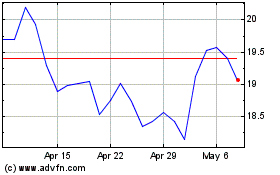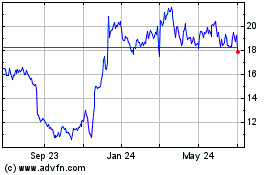By Esther Fung and Kris Maher
STEUBENVILLE, Ohio -- The Fort Steuben Mall in this former steel
town on the edge of the Ohio River is battling a double whammy of
store closures that have thrust it into a fight for survival.
On one side of the mall is an empty space that housed a Sears
department store and automotive center until the struggling
retailer closed the location last June.
On the opposite side sits a Macy's set to close in early spring,
the retail chain said early this month, as part of 100 closures
announced last summer.
Together, the two anchor locations make up 37% of the property's
leasable space.
Fort Steuben Mall is being swept up in a wave of store closings
that is buffeting landlords across the U.S. Specialty retailers
such as the Limited and department stores such as Sears and Macy's
in recent months have announced plans to close hundreds of stores
nationwide and slash jobs as online shopping takes a growing share
of revenue.
The rise of online shopping has created tough times for the
traditional retail model, said Stephanie McVicker, general manager
of the Fort Steuben Mall for its owner, DLC Management Corp.
Malls in smaller U.S. cities are often linchpins of local
economies and their struggles can have a ripple effect, from jobs
and tax revenues to the fortunes of logistics and transportation
companies that provide trucking and inventory support for stores.
Creditors who invest in mortgage securities tied to troubled malls
face the risk of default.
Now the 43-year-old Fort Steuben Mall faces a spiral in which
fewer shoppers could lead to more store closures, which could lead
to still fewer shoppers, and so on, analysts said.
"In weaker malls sometimes you see an anchor blow out, and then
another anchor blow out," said Steve Kuritz, managing director at
Kroll Bond Rating Agency, who studies distress in commercial
mortgage-backed securities. "It's a binary situation where strong
malls continue to do well and then there are malls that are
duds."
An appraisal of Fort Steuben Mall last March, before the Sears
closure, by property consultancy Cushman & Wakefield noted that
the mall's in-line occupancy rate, or that of non-anchor stores,
declined to 54% from 68% over the past four years.
Three anchor stores remain open at the mall: Wal-Mart, the
largest; along with J.C. Penney and a stand-alone Dick's Sporting
Goods across the parking lot.
But the departure of two anchors within a year is a tough blow.
It typically takes landlords one to three years to redevelop big
retail spaces, and they usually know in advance when a store is
closing due to low sales.
"It becomes more challenging if you have four anchors and two
are closing," said Mark Hunter, managing director of retail asset
services at real estate services firm CBRE.
At the Scent Shop, a retailer of candles and home crafts near
the old Sears at Fort Steuben Mall, foot traffic and sales fell
between 30% and 35% after the Sears closed, according to the
store's manager, Amanda Vargo. She expects both measures could fall
another 50% after Macy's shuts its doors.
"I see things falling like a domino effect by summer," she said.
"We all feel like our jobs are in jeopardy."
The closures in turn could weigh on the economy of this city of
about 18,000 that sits 40 miles west of Pittsburgh. Sears employed
53 people. The Macy's store has 59 employees.
"It's very, very sad," said Jamie McCallister, a Macy's jewelry
associate who stood behind a glass case of gold and silver chains
and earrings as a liquidator earlier this month walked through the
store adding discounts to individual products. "I'm just
heartbroken."
DLC purchased the mall for $43 million in 2006, just before the
recession. Since then, the mall has suffered from store closures
including apparel retailer Steve & Barry's, Waldenbooks and
Toys "R" Us.
Kroll now values the mall at just $7.4 million, taking into
account the coming loss of Macy's. It projects creditors face a
loss of $31.3 million.
When Fort Steuben Mall opened in 1974, it benefited from the
growth of the steel mills in the area. As the steel industry shrank
in the 1980s and plants from Wheeling-Pittsburgh Steel closed, the
population in the area dwindled, and the mall's fortunes began to
turn.
Terri Hutton frequented the mall regularly in the 1970s and
1980s to buy clothes for her children.
"Any store you can imagine to go to was here," said Ms. Hutton,
a 60-year-old auctioneer who lives 25 miles to the west in Cadiz.
Once, she said, she came to hear a young Tanya Tucker perform her
hit song "Delta Dawn" beneath a skylight at the center of the
mall.
Today, that same atrium has a barren look. The beige carpet is
worn and two facing storefronts, former jewelry stores, are
empty.
The last time the mall signed a new tenant was in April when a
Mexican restaurant inked a lease for a 3,286-square-foot space,
according to DLC's website.
"I'm guilty," said Ms. Hutton, acknowledging she rarely visits
the mall these days. Now that her daughter does much of the
family's shopping online, she comes to the mall maybe once a year,
she said.
The mall operators have tried to boost foot traffic by hosting
church concerts, gingerbread cookie decorating events, pet adoption
drives, book signings and fundraisers.
Patricia Maple-Damewood, president of the Jefferson County
Chamber of Commerce, said she plans to send a letter to Macy's
executives asking them to reconsider closing the store, adding that
a nearby university, small manufacturers and shoppers from West
Virginia and Pennsylvania support a strong customer base for the
mall.
The mall's leasing department has received calls from parties
interested in the two anchor locations and they aren't traditional
retailers, said Ms. McVicker, who declined to name them. She added
that call centers and medical supply companies have filled similar
vacancies at other malls.
"I'm certainly confident that the mall will stay open," she
said. But she acknowledged the urgent need to find new tenants.
"You don't want to have empty space," she said. "It doesn't give
out a lot of confidence."
(END) Dow Jones Newswires
January 19, 2017 09:14 ET (14:14 GMT)
Copyright (c) 2017 Dow Jones & Company, Inc.
Macys (NYSE:M)
Historical Stock Chart
From Mar 2024 to Apr 2024

Macys (NYSE:M)
Historical Stock Chart
From Apr 2023 to Apr 2024
